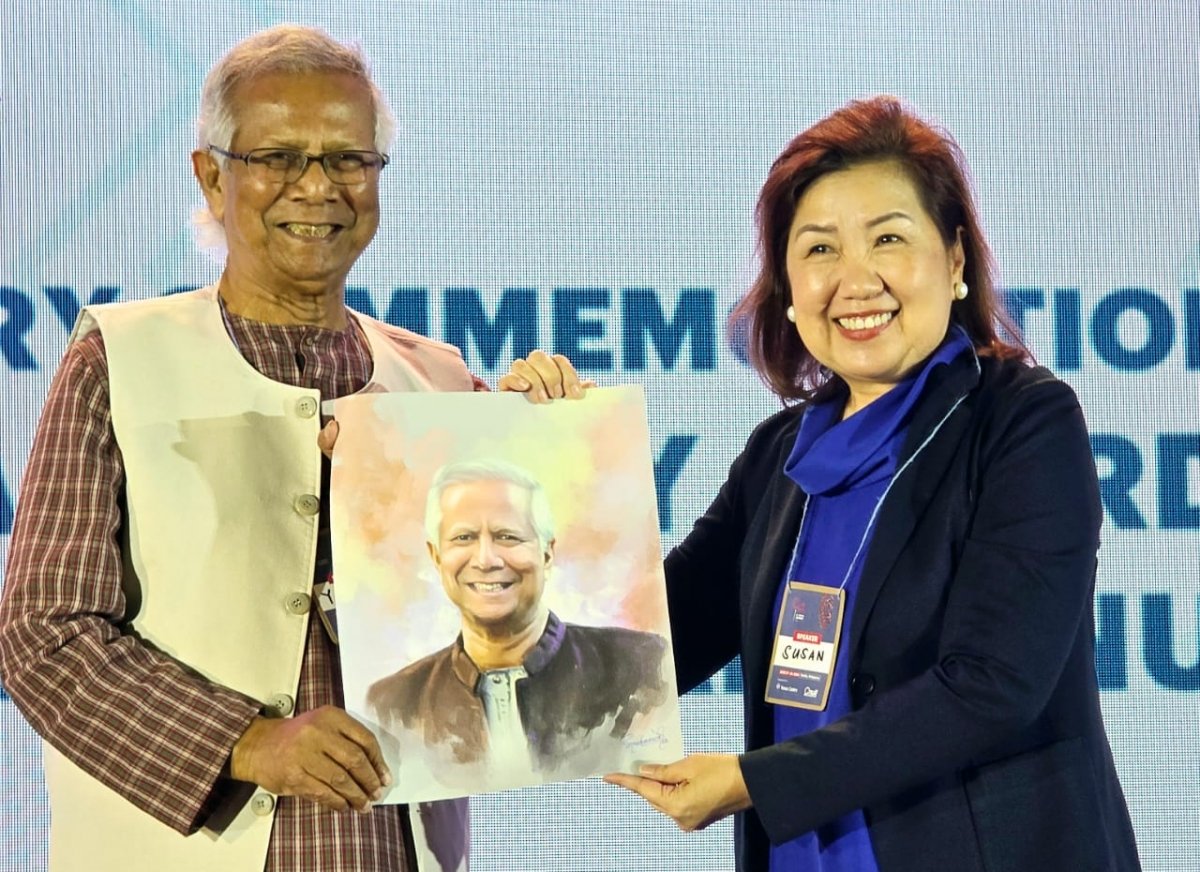"They Might Put Me in Jail"
Muhammad Yunus:
"They Might Put Me in Jail"
Nobel laureate Muhammad Yunus faces criminal charges in Bangladesh, which many see as part of a defamation campaign. Now, Yunus has decided to speak up.
Interview: Bastian Berbner und Jens Tönnesmann

"I don’t want to leave Bangladesh", says Nobel laureate Muhammad Yunus. "Also, if I go, what happens to the many people I work with?". © Denis Meyer/imago images
There has been growing concern that Nobel Peace Prize Laureate Muhammad Yunus, 83, could be jailed in his home country of Bangladesh. Other Nobel Laureates like Barack Obama and Lech Walesa, former presidents of the USA and Poland, have joined forces with activists like Jane Goodall and Bono to support Yunus. Since March 2023, his supporters have written open letters to Sheikh Hasina Wajed, Prime Minister of Bangladesh, to express their "profound concern over the continued harassment" of Yunus. In January, Yunus had been sentenced to prison by a Bangladesh court; he remains free on bail. But last week, eight companies he founded have been seized. With ZEIT Online, he spoke about the situation since the recent attacks against him.
ZEIT ONLINE: Professor Yunus, many of our readers know you as the Nobel Peace Prize Laureate who has been promoting microcredit and social entrepreneurship for decades. Now we reach you at your home in Dhaka, the capital of Bangladesh, where you are under enormous pressure.
Muhammad Yunus: The situation is very alarming, very bleak. Our offices have been taken over by strangers.
ZEIT ONLINE: Please tell us what happened over the past days.
Yunus: A week ago, a crowd of about 35 people entered the new building which houses the headquarters of our social business companies. They passed the security guards, jumped over security barriers, and announced to take over the eight companies. They did not allow employees to leave until 9 pm. They locked the offices with their own locks as they left the building for the night. The next morning they came back, and opened the locks to let in the staff of the companies. With each day, they have become more aggressive.
ZEIT ONLINE: Who are these people?
Yunus: They introduced themselves as people sent by the bank that I founded and that I was pushed out of in 2011.
ZEIT ONLINE: Since then, the bank is practically run by the government. Are you saying, these people were sent by the government?
Yunus: I can’t say that. All I know is, we called the police and we weren’t helped.
ZEIT ONLINE: Your daughter has spoken on your behalf with Christiane Amanpour. You have been careful in the past, avoiding to criticize the forces pressuring you. Now you have decided to speak on the record. Why?
Yunus: Because our existence is threatened by force.
ZEIT ONLINE: Could you be more specific: Who is behind these recent attacks?
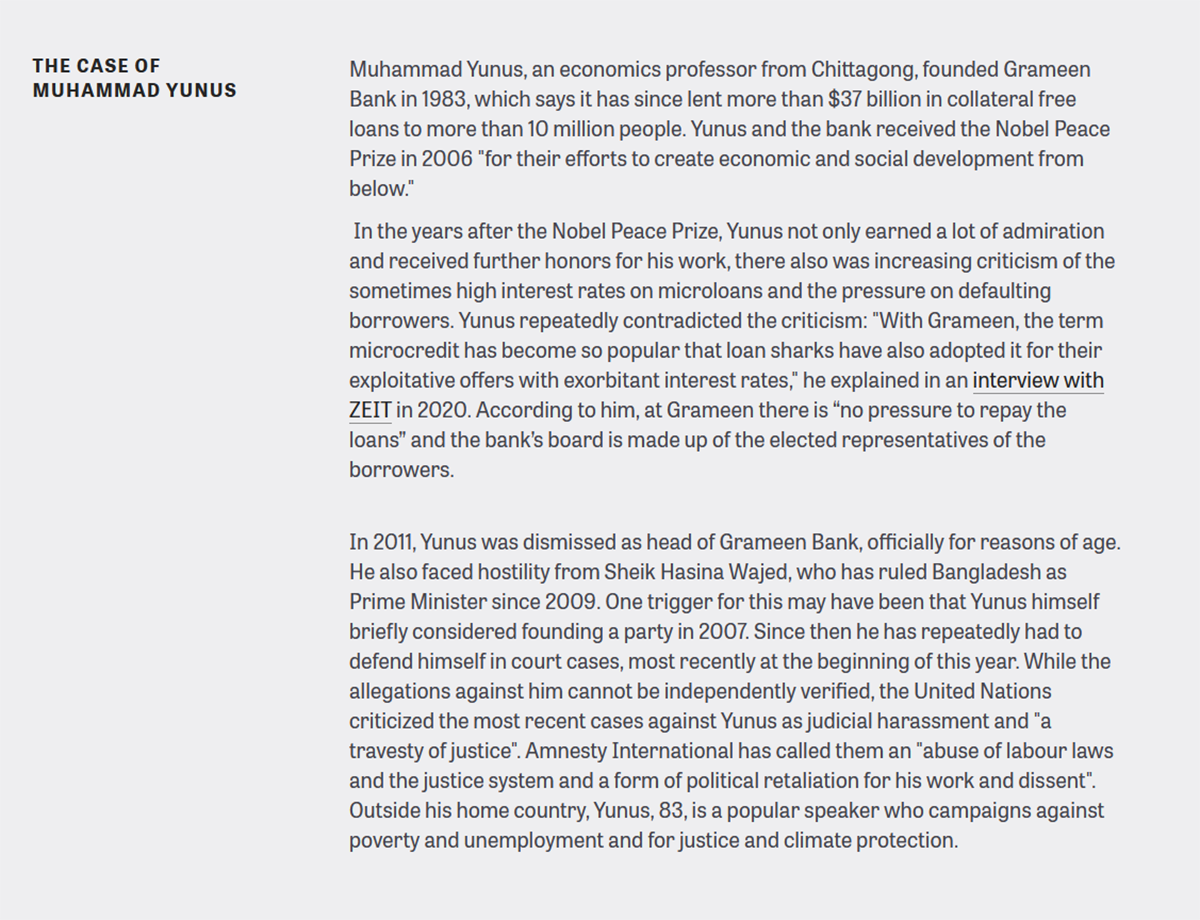
Yunus: In Bangladesh everybody knows how these things happen. We are not supposed to name names; it brings heavy consequences.
ZEIT ONLINE: People point to Sheik Hasina Wajed, the Prime Minister, who has just been reelected on January, 7th.
Yunus: Well, elections is one way to describe it… There was no opposition. The main opposition politicians were in jail.
ZEIT ONLINE: In the months leading up to the election, countless members of the opposition were embroiled in politically motivated court cases. But Sheikh Hasina has been openly defaming you directly in the past. In 2011 for example, she called you a "bloodsucker to the poor".
Yunus: Yes, she claimed that I created the bank to suck the blood of the poor people by offering them loans with excessive interest rates. The opposite is true: The loans enabled poor people to start their own businesses and escape from poverty, the bank is even owned by the rural poor whom it is serving. She also claimed that I am conspiring with the American government to block world bank funding for the building of the longest bridge in the country. Which I never did.
ZEIT ONLINE: The world bank canceled the funding for the bridge in 2012, claiming it had evidence of corruption. When the bridge was opened nevertheless in 2022, Sheik Hasina reportedly threatened to throw you in the Padma river.
Yunus: It was a huge ceremony, all the dignitaries were there, ambassadors and foreign guests. But the Prime Ministers’ speech was mostly about me. About how I opposed the bridge and how she won against me. She wants to make sure that I am hated by the people.
ZEIT ONLINE: Why?
Yunus: I have no idea. Some say it’s personal, some say it’s political. Anybody can make a list of reasons. It is a popular exercise.
ZEIT ONLINE: You have been under pressure for years. In 2011, you were dismissed from the bank that you founded to provide microcredits to the poor and that had brought you the Nobel Peace Prize in 2006.
Yunus: After I was dismissed, they hoped that I would no longer be visible, and nobody would remember me.
ZEIT ONLINE: That did not work. You are probably the most well-known citizen of Bangladesh. You’ve been invited all over the world to promote your thinking.
Yunus: And they didn't know how to deal with it. So now they come at me with ludicrous legal cases. In January, I have already been sentenced to six months of prison.
ZEIT ONLINE: Irene Khan, a UN special rapporteur who was present in the court, has called this case "a travesty of justice".
Yunus: It is. I'm out on bail right now. And the next case will begin soon, on March 3rd. I am wrongly accused of having stolen lots of money from Grameen Telecom, committing the criminal offense of "money laundering".
ZEIT ONLINE: The allegations are difficult to verify independently. Is there any truth to them?
Yunus: No. They're just creating and repeating made-up stories. I keep saying to the world that I want to remain an ownership-free person. I don't own a house, a car, any land, any shares in any company anywhere in the world. Whatever I earn I put in a trust. So I'm already going through a couple of criminal cases. Now, by occupying the companies, they are taking away everything that I got.
ZEIT ONLINE: Some say that Sheikh Hasina fears your popularity. That you might want to become Prime Minister yourself.
Yunus: That’s the last thing I want. I'm fine with what I do. My goal is to build a new economic framework to create a world of three zeros -- zero net carbon emission, zero wealth concentration, and zero unemployment. Social business is central to that mission. Now if the social businesses that I built are gone, I am pushed back to the starting point.
ZEIT ONLINE: There was a moment however, when you briefly went into politics. In 2007, you thought about founding a party but then backed out ten weeks later.
Yunus: I saw what I'll be required to do in politics, I can't handle that kind of life. I thought this will be the end of it. But Sheikh Hasina keeps coming back to it. She has been in power for 15 years. Now she's beginning the journey for another five years. She got used to it.
ZEIT ONLINE: Do you feel in danger?
Yunus: Very much so.
ZEIT ONLINE: What do you think could happen?
Yunus: Various forms of social and legal punishments. They might put me in jail. Also, I fear that whatever has been built will be destroyed.
ZEIT ONLINE: On Friday, there were reports that Alexei Navalny died in Russia while imprisoned.
Yunus: Yes, it’s tragic. People now look at me with this question in their eyes. They are worried that the same thing will happen to me.
ZEIT ONLINE: Are you worried?
Yunus: I leave it to my destiny.
ZEIT ONLINE: Since March 2023, other Nobel Laureates and international leaders have written three open letters to Sheik Hasina, calling for an end of the harassment. Just now, the United Nations have publicly expressed concern that your entities have been occupied and declared their support.
Yunus: For me, this is important. It keeps me going. Unfortunately, the prime minister so far hasn’t cared what the UN says.
ZEIT ONLINE: What are your options now?
Yunus: Many friends from abroad invite me to come to their countries. I have been offered citizenship, resources and research facilities at universities. But I don’t want to leave Bangladesh. I always tell them I have been working in Bangladesh all my life. Also, if I go, what happens to the many people I work with? Once I leave, nobody will know what happened to those people who gave their lives to build these amazing institutions for the world.
ZEIT ONLINE: Sheikh Hasina has been in Germany over the weekend for the Munich Security Conference. She was on stage talking about climate change. She met Chancellor Olaf Scholz and various prime ministers.
Yunus: She's a woman prime minister, the longest serving women prime minister. She knows that as soon as she's quote unquote elected, everyone will congratulate her. Everybody will come with a bouquet of flowers. And that's exactly what happens, no matter what she does at home. She understands the psychology of the world very well.
This interview has been edited and condensed for length and clarity.
Related
15th Social Business Day 2025 to be held on June 27–28
Statement from Professor Muhammad Yunus:
দেশবাসীর উদ্দেশ্যে প্রফেসর ইউনূসের বক্তব্য
Prof. Muhammad Yunus felicitated in Manila on the occasion of his 40th anniversary of receiving the “Ramon Magsaysay” Award.
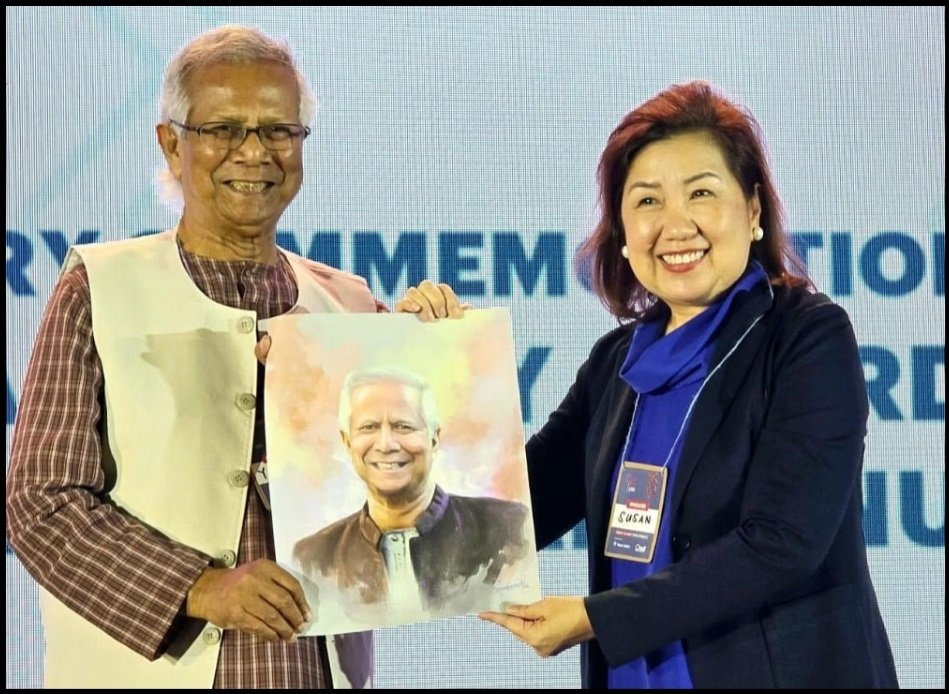
“র্যামন ম্যাগসাইসাই” পুরস্কার প্রাপ্তির ৪০তম বার্ষিকী উপলক্ষে প্রফেসর মুহাম্মদ ইউনূসকে ম্যানিলায় সম্মাননা প্রদান

Social Business Academia Dialogue & 3ZERO Club Convention 2024 held in Manila, Philippines
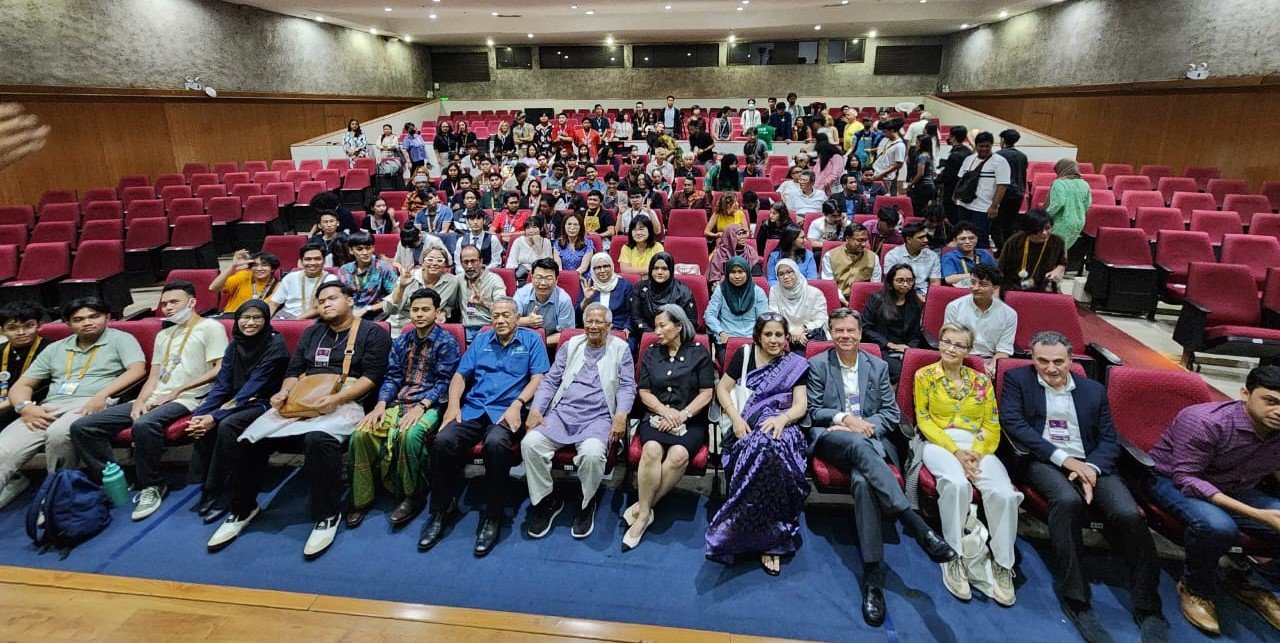
The 14th Social Business Day concludes in Manila, Philippines
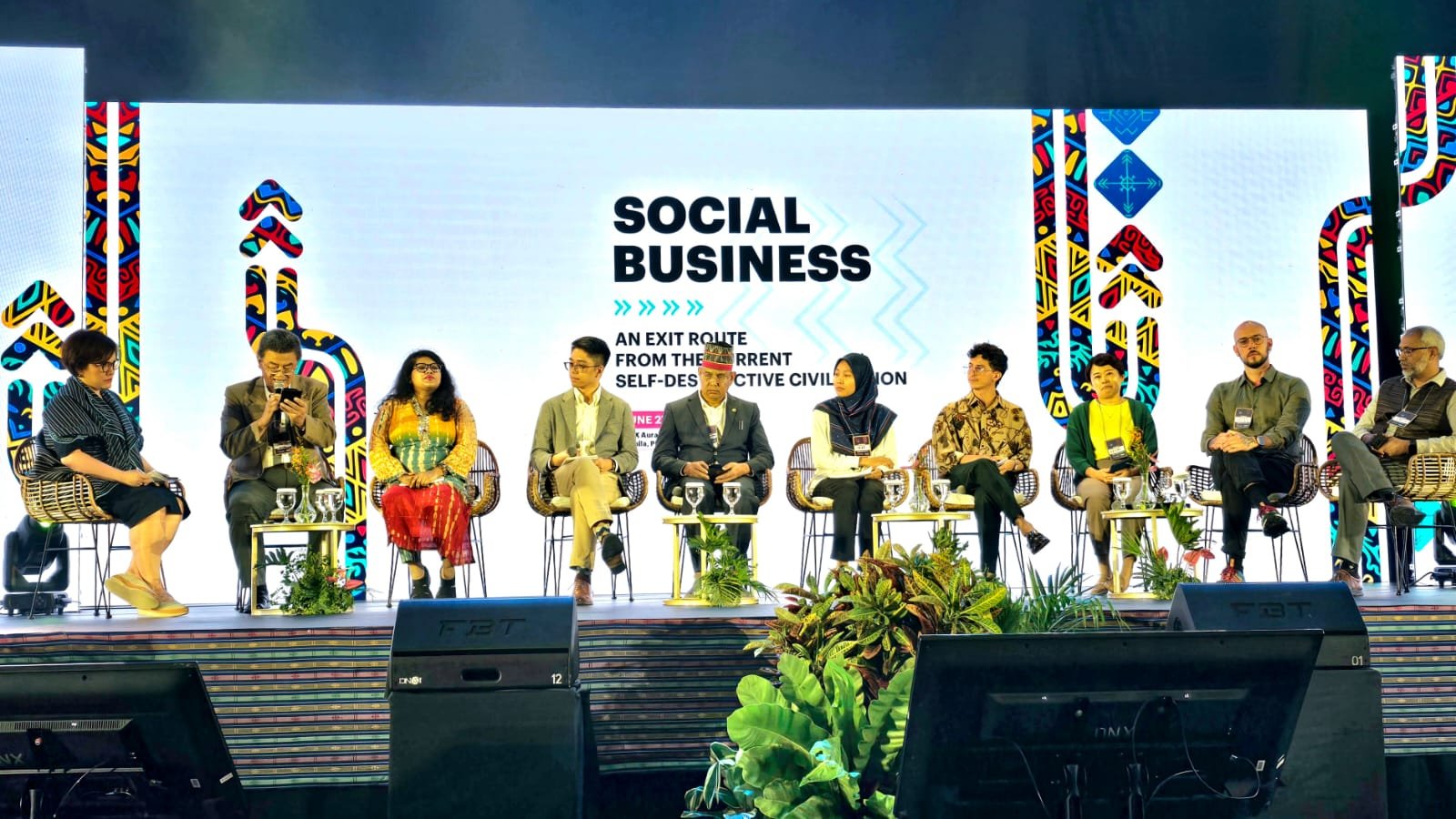
The 14th Social Business Day 2024 kicks off in Manila, Philippines
